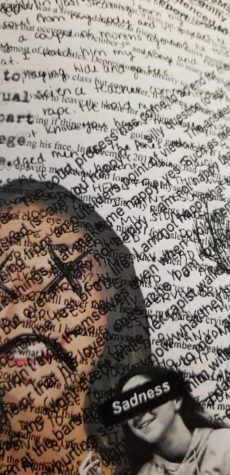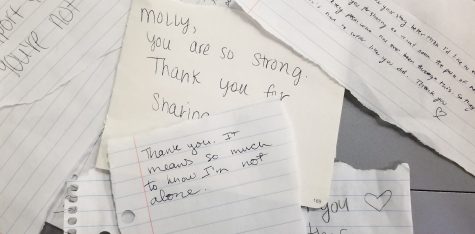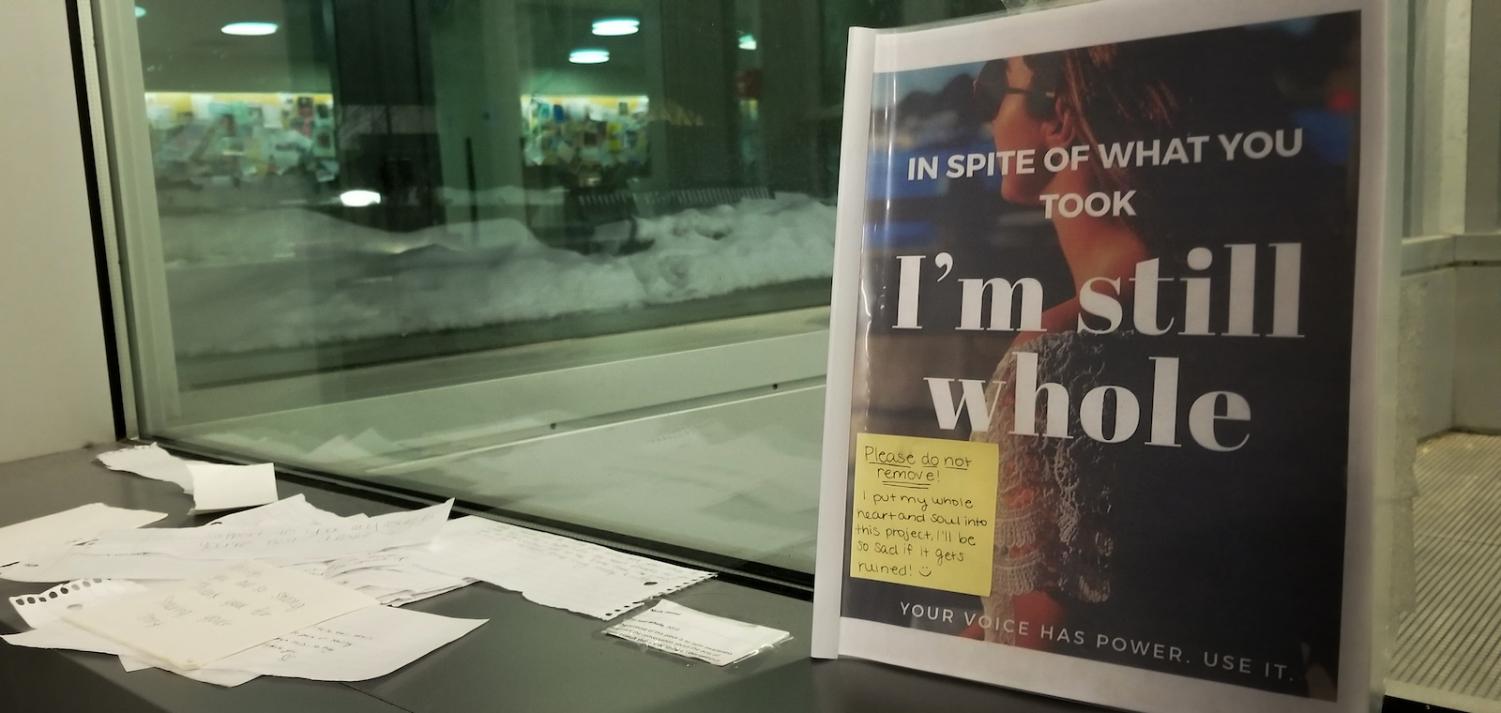“I’m Still Whole:” A rape survivor’s journey of healing
"Thank you. It means so much to know I’m not alone."
December 11, 2019
AMHERST – Stationed on a window ledge near the first-floor exit of the Integrated Learning Center lies a growing stack of heartfelt, handwritten notes that sometimes blow away from the outside wind, and a piece of Molly Hamel’s heart. It’s cradled inside a brief booklet – just 8 pages in length – bearing her art, poetry and, most importantly, her journey of healing in the years after her rape while attending UMass Amherst.
“Thank you,” writes Hamel, a senior psychology and art double major, on the first page of her project, “I’m Still Whole.” “Thank you for caring enough to take a second out of your day to stop and look through this. I am creating this project with the hopes that it helps take a step in the right direction to end sexual violence on campus.”
Featuring letters addressed to her readers, herself – both past and present – and even the man who she now refers to as, “the boy who raped me,” “I’m Still Whole” is Hamel’s way of using her voice to bring awareness to one of the most prevalent issues facing college campuses: sexual assault.
According to the Rape, Abuse & Incest National Network, 11.2% of students are raped or sexually assaulted during their time in college. At UMass, 124 incidents of rape were reported between 2012 and 2018, according to compiled data from archived UMass Annual Security Reports. Of those 124 cases, 23 occurred in 2018. Five more than the previous year and the highest amount seen across this seven-year span.
However, these numbers are only a sliver of what actually takes place at UMass. According to the National Crime Victimization Survey, rape is one of the least reported crimes with nearly 77% of survivors opting not to report to police. Making it a silent epidemic, especially on college campuses.
“I wanted to put it on campus to catch people’s attention as they were walking by,” said Hamel as she explained her reasoning for placing the project in a spot that sees thousands of people each day. Its public presence is her way of grabbing the university’s attention after countless failed attempts to reach out to UMass administration.
This isn’t the first time UMass has caused her disappointment, either.

“I went to the Dean of Students two months after [my rape], and she kind of told me that there was really nothing she could do, which was really shocking to me,” Hamel said. Per university policy, she was offered a ‘no contact’ order that would prevent the man from communicating with her but the two could still be in the same room. It wasn’t ’till his indictment for two counts of rape in June 2018 – around eight months after the incidents occurred – that UMass took more action.
“They were like, ‘We can’t have this kid here anymore,’ but that wasn’t until a year after I reported. So in terms of the university, they weren’t very helpful for me in my situation,” Hamel recounted. A year later in September, he was sentenced to three to five years in state prison for one count of rape.
While she “gets it,” Hamel still feels frustrated by how the university neglects to take even small steps towards supporting sexual violence survivors.
“They definitely could have done better. Throughout my court process… no one checked up on me, no one reached out… they really did nothing for me,” she added.
In a way, Hamel’s 8-page booklet has become that source of support for other sexual assault and rape survivors at UMass. Stacks of handwritten notes lay near Hamel’s project anonymously voicing their support and appreciation for the vulnerability and strength she displayed on each page. This support outweighs the negative feedback she’s received, including one copy of her booklet being written on and eventually thrown away.
“I love walking by this everyday and watching this pile of papers grow more and more,” wrote one person on a ripped piece of paper. “We are not alone. We have each other. Thank you for this wonderful piece.”
“Thank you,” another note said. “It means so much to know I’m not alone.” Sadly, this feeling of isolation can be common among survivors.

“No one’s hearing about this stuff. I had no idea and I was going through it,” said Hamel, referring to the prominence of sexual violence on college campuses. Part of her project was inspired by all the information she discovered while trying to look up her own trial online. “Even going through court, I would have felt so much better knowing that there were other students. I thought it was just me.”
Through her group, It’s On Us, a national campaign focused on addressing sexual assault on college campuses across the country, Hamel has worked to advocate for more education on the issue at UMass. She believes initiatives like increased transparency with rape statistics and comprehensive programs on the topic for students, faculty and staff could help improve campus culture.
Pushing to start these conversations is key to not only preventing sexual assaults, but to also provide a safer space for survivors to feel supported and understood.
“It’s tiny steps that they could take to make campus so much safer and to make survivors feel so much better, and they just aren’t taking them yet,” Hamel said. “I don’t know if it’s a lack of education on administration’s part, or if it is a silencing thing like they’re trying to sweep it under the rug.”
This advocacy and outspokenness that Hamel wears proudly on her sleeve have been part of her healing process, but where she is now didn’t happen overnight. It took her a year-and-a-half of bad days, court hearings, therapy and internalization to reach a point where she felt comfortable sharing her story publicly. It got to the point where for two semesters, she skipped classes and meals and neglected to sleep.
Having her art and poetry, as well as her parents’ support, also helped with building herself back up as strong and as quickly as she did. But while Hamel is in a better place now than she was two years ago, she still feels lingering effects from her rape.
“I still feel you on my skin,” she writes in a poem from her booklet. “When my lover tries to show me what love feels like/ I still feel you on my skin.”
However, that doesn’t mean he holds any power over her – a fact Hamel outlines in the last letter of her booklet, “September 16, 2019.”
“I want you to notice that I am no longer calling you ‘my rapist’ but have switched to the terms ‘the boy who raped me,'” writes Hamel. “I am not your victim. You do not own me. You do not hold that kind of power.”
Email Brian at [email protected] or follow him on Twitter @brianshowket.
